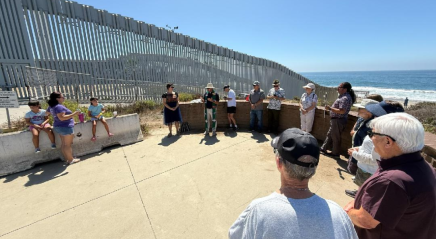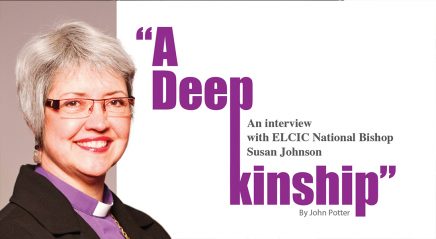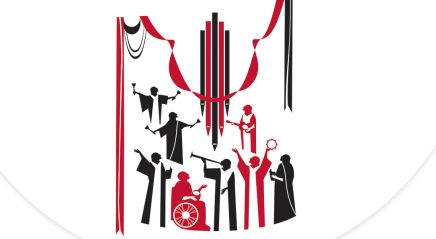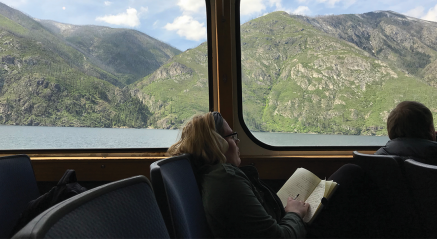After 100 years, the sanctuary at Trinity Community Lutheran “is like the inside of a cello or a violin,” said Sydney Morris, a pastor of the congregation. “All that devotion has soaked into the walls.”
The walls of this sanctuary stand in Point Roberts, Wash.—where being the church means crossing borders.
Nestled on the southernmost tip of British Columbia’s Tsawwassen Peninsula, Point Roberts is south of the 49th parallel, which divides the United States and Canada. To get there by land, you must enter Canada, drive 25 miles around Boundary Bay and enter the United States again.
Many of Point Roberts’ 1,200 full-time residents—Trinity members included—are dual citizens of the two countries. Both the Stars and Stripes and the Maple Leaf fly above the local grocery store. In summer, the population swells with Canadian cottage owners and vacationers.
Trinity honors both countries by celebrating Thanksgiving twice—in October for Canadians, in November for Americans—and accepting offerings in both nations’ currencies. Several Canadians are on the congregation council. Drawn by the small sanctuary’s great acoustics, U.S. and Canadian musicians offer concerts.
People who weren’t Icelandic, Lutheran or even American began attending.
This easy, cross-border culture was upended in 2020 by the COVID-19 pandemic. For 19 months, U.S. citizens from Point Roberts could drive across Canada (without leaving their cars) to the Peace Arch in Surrey and enter Washington state for medical reasons, but Canadian residents could not enter or leave the Point without a 14-day quarantine. Businesses cut back hours and laid off staff.
When the border opened, Trinity’s pews didn’t fill. “We were down to 20 people on a good day, so the council wanted to find ways that were more welcoming besides the traditional Lutheran service,” said Jean Barrington, a pastor of Trinity.
Louise Cassidy, the parish administrator and a dual citizen, remembers that just as the church’s attendance numbers began growing, President Donald Trump called for Canada to be annexed as the 51st state. “That was enough to make everybody mad!”
The president’s suggestion to annex Canada, his 35% tariffs and the potential enforcement of a long-forgotten law that requires foreign nationals staying in the U.S. for more than 30 days to be fingerprinted and registered—which would affect about half the Point’s residents—made Canadians wary of crossing the border.
No one should be surprised, then, that Trinity “is experiencing a very noticeable decline in participation by Canadian members and neighbors, as is the Point in general,” Cassidy said.
From Icelanders to everybody
When Trinity was founded in 1913 by Icelandic immigrants, it offered services just twice a month and only in summer.
Pastors from the Icelandic community in British Columbia and mainland Washington state led worship. Congregation members stepped up to provide music, teach Sunday school, organize bazaars and offer postworship potlucks.
People who weren’t Icelandic, Lutheran or even American began attending. In 1972, Trinity Lutheran became Trinity Community, “with all faiths being welcomed to worship and the building to be used for baptisms, weddings and funerals,” the local newspaper reported.
Concerts and music camps showcased regional musical talents, and the choir program was strong.
“When the choir stood up to do an anthem, half the church stood up,” remembered parishioner and Vancouver resident Steve Deller, an Anglican.
Trinity still has a robust music program and a community-building potluck every Sunday. Now, with the blessing of the council, the only church on the Point is moving away from Lutheran-only services to a different worship experience each week.
No matter the politics along the border, “the message is always, all are welcome.”
One Sunday, Barrington, an ELCA pastor, leads a service from Evangelical Lutheran Worship. The next, Martin Pommerenke, an Episcopalian priest from Bellingham, Wash., leads a more high-church liturgy. Interfaith pastor Bev Mar uses Lutheran hymns, prayers and readings but aims to model “being able to relate to the stranger without fear, because we know more about each other.” Member Andy Leaf calls her “the coexist pastor.”
When Morris, a Unitarian Universalist pastor, leads worship, she asks a member to give a five-minute talk on what it means to be a Christian. “These gracious, heartfelt talks are teaching me,” she said.
Testimonials are central to Jazz Vespers, held when there is a fifth Sunday of the month. This afternoon service mixes jazz with personal stories about lives and faith journeys. “It’s a really different gathering that encourages nonreligious people to come in and enjoy the building and some music,” Barrington said.
Whether Vespers takes place in the garden or indoors, “people are coming, listening and getting to know one another,” said Lucy Williams, music director.
“We let people know that not every pastor is going to give a sermon that everyone can relate to,” she said. “But by golly, by the time you’ve listened to all four, you get something.”
No matter the politics along the border and the paperwork required to cross, “the message is always, all are welcome,” said member Andy Mar.











